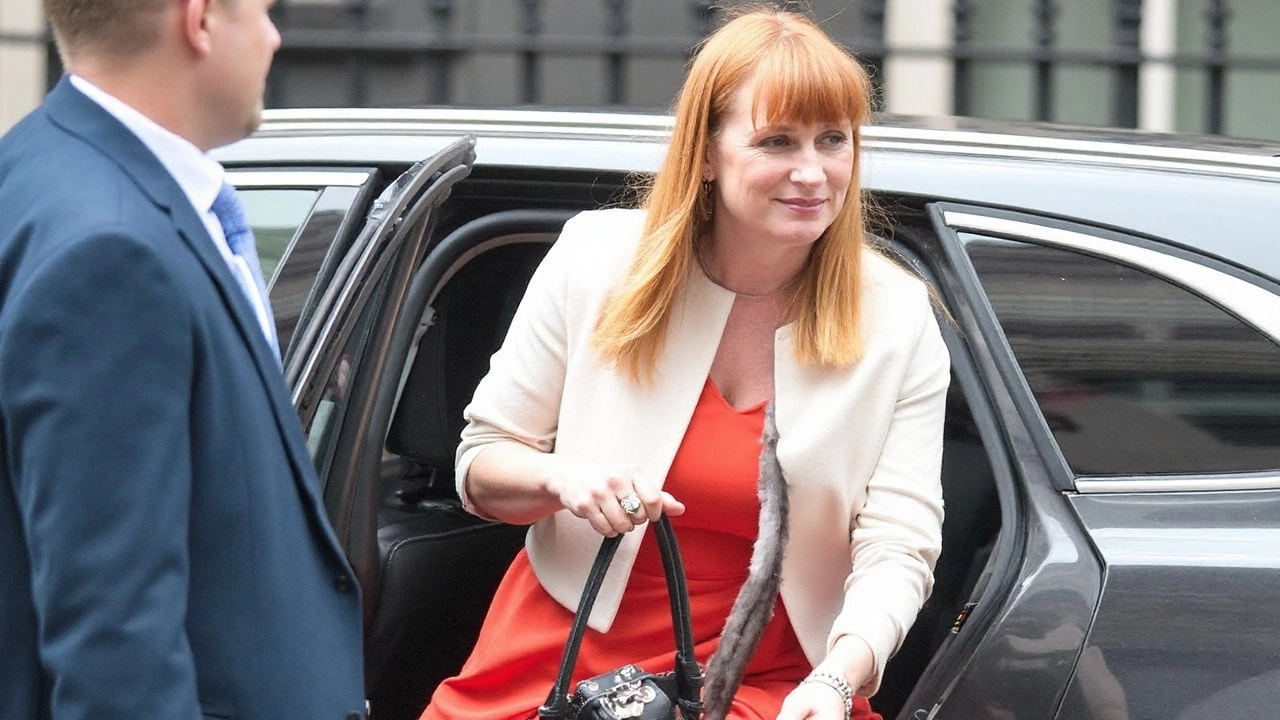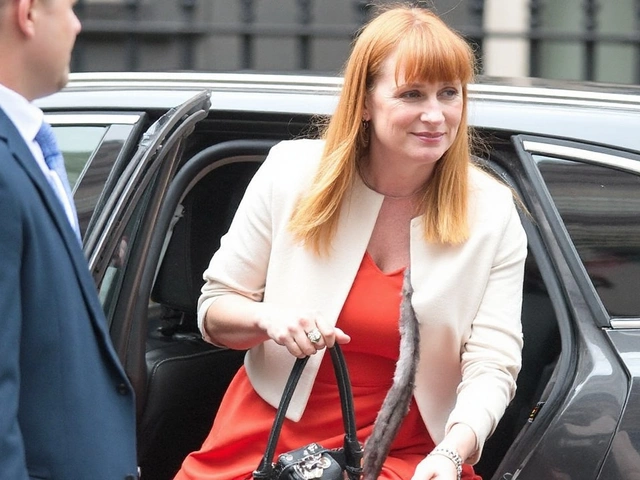A teenage mum who left school with no qualifications became the UK's second female Deputy Prime Minister. Fourteen months later, she quit after an ethics ruling on stamp duty. That is the arc that made — and unmade — Angela Rayner, one of the most recognisable faces in British politics.
Her story has always been striking: a care worker turned union organiser who won a safe Greater Manchester seat in 2015 and rose at speed through Labour's ranks. She won the party’s deputy leadership in 2020, stuck through bruising internal battles, and, after Labour’s 2024 landslide, stepped into Downing Street as Keir Starmer’s deputy and Housing Secretary. Then came the fall — swift, public, and final.
From a care worker’s rota to Westminster’s front bench
Rayner was born in Stockport in March 1980. She left Avondale School at 16, pregnant and with no GCSEs. She trained in social care at Stockport College, joined the local council workforce as a care worker, and found a voice as a Unison representative. That union work — case-by-case advocacy, standing up for colleagues, learning to argue and negotiate — nudged her into the Labour Party.
By 2014, Labour selected her for Ashton-under-Lyne. She won in 2015 and quickly became one of the most visible new MPs. Under Jeremy Corbyn she held senior shadow roles, including Shadow Education Secretary. She called herself a socialist but kept a deliberate distance from labels, insisting she made up her own mind. The tone was blunt, plain-spoken, sometimes combustible — the same style that later made her both a media draw and a target.
Her rise didn’t stall with Labour’s defeats in 2017 and 2019. In 2020, members elected her deputy leader. Inside Starmer’s team she took on high-profile briefs, including the Cabinet Office and later the housing portfolio in opposition. She fronted reform ideas on skills and workers’ rights and, crucially, became central to Labour’s 2024 pitch on planning and housebuilding.
When Labour won big in July 2024, Starmer named her Deputy Prime Minister and Secretary of State for Housing, Communities and Local Government. Just like that, she was at the top tier of government. She stood in at Prime Minister’s Questions when Starmer was away, trading barbs with Conservative deputy Oliver Dowden — a clash she once nicknamed “the battle of the gingers.” It was classic Rayner: punchy, unapologetic, media-friendly.
Her department carried one of Labour’s largest promises: 1.5 million new homes over the parliament. The blueprint leaned on faster planning decisions, reviving mandatory local targets, new towns, and a push to build on low-quality “grey belt” land while protecting the green belt proper. She talked about cutting red tape on stalled sites, staffing up planning departments, and nudging private builders and councils to move in step. Delivery, though, was always the real test — planning reform is slow, legal challenges are common, and Britain’s housing shortage is decades in the making.
Rayner’s background amplified the message. A housing secretary who grew up on a council estate, worked in social care, and became a grandmother in her 30s resonated beyond Westminster. She made a point of talking about low pay, the insecurity of renting, and the gap between the London bubble and towns like Ashton-under-Lyne. In December 2024, the BBC placed her on its 100 Women list, a nod to her profile at home and abroad.

Power, scrutiny, and the stumble that ended it
None of this came without heat. In politics, the climb brings the spotlight, and the spotlight brings paperwork. During the 2024 election campaign, Greater Manchester Police looked into claims around the sale of her former council house bought under the right-to-buy scheme. The issue was whether she should have paid Capital Gains Tax on a 2015 sale that netted a £48,500 gain. HMRC examined the case. In the end, she was cleared; tax officials concluded no CGT was due, and the police closed the file.
Then came a different row: her use of Labour peer Lord Waheed Alli’s New York apartment and several thousand pounds’ worth of clothing. The complaint wasn’t that she took them; it was how she registered them. Ministers must declare interests properly and on time. After criticism, she said she would stop accepting clothes from donors. The paperwork was updated and, in political terms, the fire went out.
The final blow landed in September 2025. Starmer’s independent ethics adviser, Laurie Magnus, found she had breached the Ministerial Code over underpaid stamp duty on a property purchase. Stamp Duty Land Tax is technical but unforgiving — the rate you pay depends on price, whether it’s an additional property, and the timing of sales. Misjudge any of those and you can underpay. In government, intent matters, but so does accuracy. The code makes clear that ministers must comply with the law and the spirit of those rules.
Breaches trigger a familiar process: the adviser investigates, reports to the Prime Minister, and the PM decides what to do. Sometimes a correction and apology suffice; sometimes they don’t. Rayner resigned from both roles — Deputy Prime Minister and Housing Secretary — on 5 September 2025. For a politician who built a brand on straight talking and fairness, it was a brutal ending.
Her critics will say the stamp duty case capped a pattern of sloppiness. Her supporters will point out that she was cleared over capital gains, corrected her declarations on gifts, and faced a level of scrutiny that often tracks women and working-class politicians more ruthlessly. Both things can be true: she attracted unusual attention, and a minister has to be watertight on rules. High office leaves no room for near misses.
The resignation also matters for policy. Housing was designed as a flagship where Labour planned to show early delivery: get shovels in the ground, reset the planning system, and bring councils, housing associations, and builders into the same room. Rayner’s exit doesn’t kill the plan, but it removes its most visible champion. A successor will inherit the promise and the headaches — bottlenecks in planning, shortages in planning officers, the tug-of-war over green belt boundaries, and developers who hold land for timing and price.
It’s worth noting how fast this journey was. Within a decade of entering Parliament, Rayner had sat in every big meeting that mattered. She ran national campaigns, tackled education as a frontbencher, sparred across the dispatch box, and jumped into the thorniest file in domestic policy: housing. The speed helped her; it also denied her the dull, careful years where veteran ministers learn to live by the book.
Her public image never softened. In 2021, she called Conservatives “scum” at a fringe event and later apologised. The remark became a shorthand for her appeal and her risk: plain speaking that felt honest to supporters but reckless to opponents. Even as deputy PM, she held onto the straight-talking persona. It made interviews vivid. It also meant that, when errors appeared, critics could cast them as part of a pattern.
There’s another angle, less personal and more structural. Britain has raised the bar on transparency over the last 15 years: tighter registers of interests, faster publication of gifts, clearer tax rules around additional properties, and a stronger Ministerial Code process. These changes are good for public trust. They also make government a paperwork minefield. You need lawyers and accountants, not just political nous. The risk for ministers who come from outside Westminster’s traditional mould is obvious: the lived experience that voters value doesn’t automatically come with a compliance department.
Rayner’s case also shows how personal finance can sit at the heart of political storms. The right-to-buy sale raised sharp questions in 2024: principal private residence rules, marital homes, electoral registration. Plenty of people sell a first home, marry, and move — and never imagine a tax headache. But an MP, and especially a minister, must be able to prove the facts beyond doubt. Being cleared by HMRC mattered. It didn’t inoculate her against later mistakes.
What happens next for Rayner? She remains the MP for Ashton-under-Lyne and a national figure with a loyal base. Politicians have returned from worse — with time, with steadier processes, and with quieter months away from cameras. What she does in the Commons will tell us more than any statement. She knows the shop floor, the union hall, and the dispatch box. That mix is rare and still valuable.
For Labour, the immediate task is housekeeping: appoint a new Deputy Prime Minister, plug the gap at Housing, and keep the 1.5 million homes pledge on schedule. The party can’t afford drift. Voters who lent their trust in 2024 will want visible progress: more planning officers hired, big sites unblocked, spades working on new towns, and renters’ protections moving through Parliament. Those are measurable. Either they happen or they don’t.
Rayner’s journey remains a case study in social mobility and modern scrutiny. A care worker from Stockport made it to the second-highest office in the land. She also stumbled on rules that now define public life. Both parts are real. Both will shape how future ministers, especially those without deep Westminster networks, prepare for the pressure that comes with power.
Key moments in the rise — and fall:
- 1980: Born in Stockport.
- 1996: Leaves school at 16 while pregnant; trains in social care and becomes a care worker.
- 2007: Buys a council house under right-to-buy.
- 2010: Marries Unison official Mark Rayner.
- 2014–2015: Selected as Labour candidate; elected MP for Ashton-under-Lyne.
- 2016–2020: Serves in the Shadow Cabinet, including as Shadow Education Secretary.
- 2020: Elected Labour’s deputy leader.
- 2024 (July): Appointed Deputy Prime Minister and Housing Secretary after Labour’s election win; later named in BBC 100 Women 2024.
- 2024: Cleared by HMRC over capital gains tax allegations; police close their investigation.
- 2025 (September 5): Resigns after ethics adviser Laurie Magnus finds a Ministerial Code breach over underpaid stamp duty.
Strip away the noise and you’re left with a simple truth: politics lifts people fast and drops them faster. Angela Rayner reached the top because her life spoke to voters. She fell because the rules caught up with her. Both facts will sit side by side whenever her name is mentioned in British politics.






